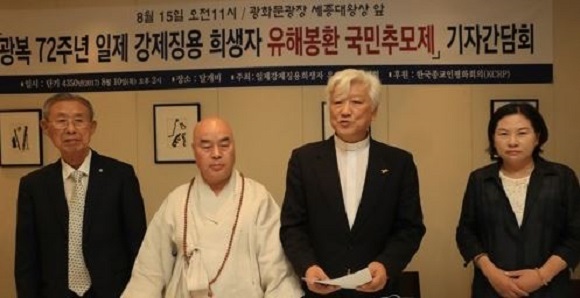Remains of 33 forced Korean workers during WW2 returned from Japan
By Catherine ChungPublished : Aug. 10, 2017 - 18:15
The remains of dozens of Koreans who died in Japan after being forced to work there during World War II have recently been returned home, according to a civic group Thursday.
The remains of 33 identified Koreans arrived on Sunday at Gimpo International Airport, from Kokuhei Temple in Higashimurayama, northern Tokyo, where they had been enshrined, the National Commemorative Committee for the Repatriation of Victims of Forced Laborers said during a press conference at a restaurant in central Seoul.
The remains of 33 identified Koreans arrived on Sunday at Gimpo International Airport, from Kokuhei Temple in Higashimurayama, northern Tokyo, where they had been enshrined, the National Commemorative Committee for the Repatriation of Victims of Forced Laborers said during a press conference at a restaurant in central Seoul.

About 300 forced Korean workers are enshrined at the temple. The remains returned on Sunday were part of the 101 identified Koreans. The remainder will be returned successively until end of 2018.
Included in the 33 was the late Park Sung-ryong, who settled in Japan after being mobilized to a coal mine in Sakhlin during the war. He passed away in 2002 with no family. Also included were people who came from the current North Korean region.
"We become keenly aware of our irresponsibility when seeing those who can't return home even after Korea's Liberation and even in today's 21st century," the committee member Rev. Kim Young-joo said.
The committee plans to hold a memorial ceremony for the victims at Seoul's Gwanghwamun Square on the Aug. 15 Liberation Day. The remains will be laid to rest at a memorial center run by the Seoul Metropolitan Government later that day. (Yonhap)







![[Graphic News] More Koreans say they plan long-distance trips this year](http://res.heraldm.com/phpwas/restmb_idxmake.php?idx=644&simg=/content/image/2024/04/17/20240417050828_0.gif&u=)
![[KH Explains] Hyundai's full hybrid edge to pay off amid slow transition to pure EVs](http://res.heraldm.com/phpwas/restmb_idxmake.php?idx=644&simg=/content/image/2024/04/18/20240418050645_0.jpg&u=20240419100350)





![[From the Scene] Monks, Buddhists hail return of remains of Buddhas](http://res.heraldm.com/phpwas/restmb_idxmake.php?idx=652&simg=/content/image/2024/04/19/20240419050617_0.jpg&u=20240419175937)

![[KH Explains] Hyundai's full hybrid edge to pay off amid slow transition to pure EVs](http://res.heraldm.com/phpwas/restmb_idxmake.php?idx=652&simg=/content/image/2024/04/18/20240418050645_0.jpg&u=20240419100350)

![[Today’s K-pop] Illit drops debut single remix](http://res.heraldm.com/phpwas/restmb_idxmake.php?idx=642&simg=/content/image/2024/04/19/20240419050612_0.jpg&u=)